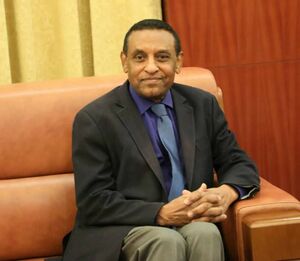Kamil Idris: Unjustified Rejection and Premature Support

On Monday, the Sovereign Council appointed former Director of Intellectual Property, Kamil Idris, as Prime Minister with expanded powers, less than a month after appointing Sudan’s ambassador to Saudi Arabia, Dafallah Al-Haj Ali, to the same position. Idris’s name has been suggested multiple times to lead the Sudanese government, most notably after the fall of former President Omar al-Bashir’s regime, when he was a strong candidate for the transitional prime ministership. However, at that time, various factors—including the strong push to appoint Abdalla Hamdok—prevented his selection. His name reemerged after the events of October 21, 2021, as a possible leader for the remaining transitional period, but again, several factors delayed the formation of a government until the outbreak of war.
Remarks on the Personality
Idris’s appointment on Monday did not come as a surprise to many. What was surprising, however, was the range of comments by journalists and activists on social media regarding his personality and potential to succeed under Sudan’s complex conditions. While journalist Abdel Majid Abdel Hamid downplayed Idris’s potential success in executive work, journalist Azmi Abdel Razek considered the appointment a good choice. Meanwhile, security expert and political analyst Lt. Gen. Jalal Tawer noted that Idris enjoys full authority and is not affiliated with any political faction—a trait that allows him to remain equally distanced from all sides.
Supporters and critics of the new Prime Minister shared videos of Kamil Idris on social media yesterday. In some, he strongly supported the army during the “Battle of Dignity” and opposed its dissolution. In others, he called on the army to hand over power to civilians and expressed support for the December Revolution. However, observers downplayed the importance of these videos, likening their use to quoting only part of a verse—”Do not approach prayer…”—arguing that the videos were contextually appropriate at the time and their current circulation is an ill-intentioned attempt to discredit him based on positions that were reasonable then.
Luqma Rejects
From the pro-army factions, Idris Luqma, a leader in the Justice and Equality Movement, rejected Idris’s appointment. In a Facebook post, he stated that he would oppose the appointment, questioning: “What has Kamil Idris achieved?”
Ardol Supports
Conversely, Mubarak Ardol, a leader of the Democratic Alliance for Social Justice, welcomed Idris’s appointment, saying:
“We praise the appointment of Dr. Kamil Idris as Prime Minister at this difficult time. He faces numerous and complex tasks that require patience and determination, including reviving the government and its civil role, normalizing life, restoring services to citizens, fostering national unity, leading the transitional period, implementing the Juba Peace Agreement, and preparing for the Sudanese political dialogue process that will culminate in general elections.”
According to sources, authorities first held consultations with Idris, and experts noted that he had insisted on being granted expanded powers. This explains a subsequent decision by the President of the Sovereign Council to cancel a prior directive that gave Sovereign Council members oversight over federal ministries and agencies. The new decision instructed members of the Sovereign and Ministers’ Councils, as well as relevant bodies, to implement the order.
According to those close to him, Idris also announced that he would make a financial disclosure before taking the constitutional oath, and that he would work without a salary and live in his private residence rather than accept government housing.
A Test Opportunity
Away from both supporters and critics, a third perspective calls for giving Idris a chance to prove himself. Judging a public official’s success or failure without testing their performance is illogical. Experts consider opposition to Idris unjustified, stemming from accumulated public skepticism caused by the disappointing appointment of Abdalla Hamdok. Many Sudanese now associate any former UN official’s appointment with Hamdok’s tenure, which not only failed to govern effectively but also led the country into a catastrophic war unprecedented in modern history.
Source: Asdaa Sudanese website



